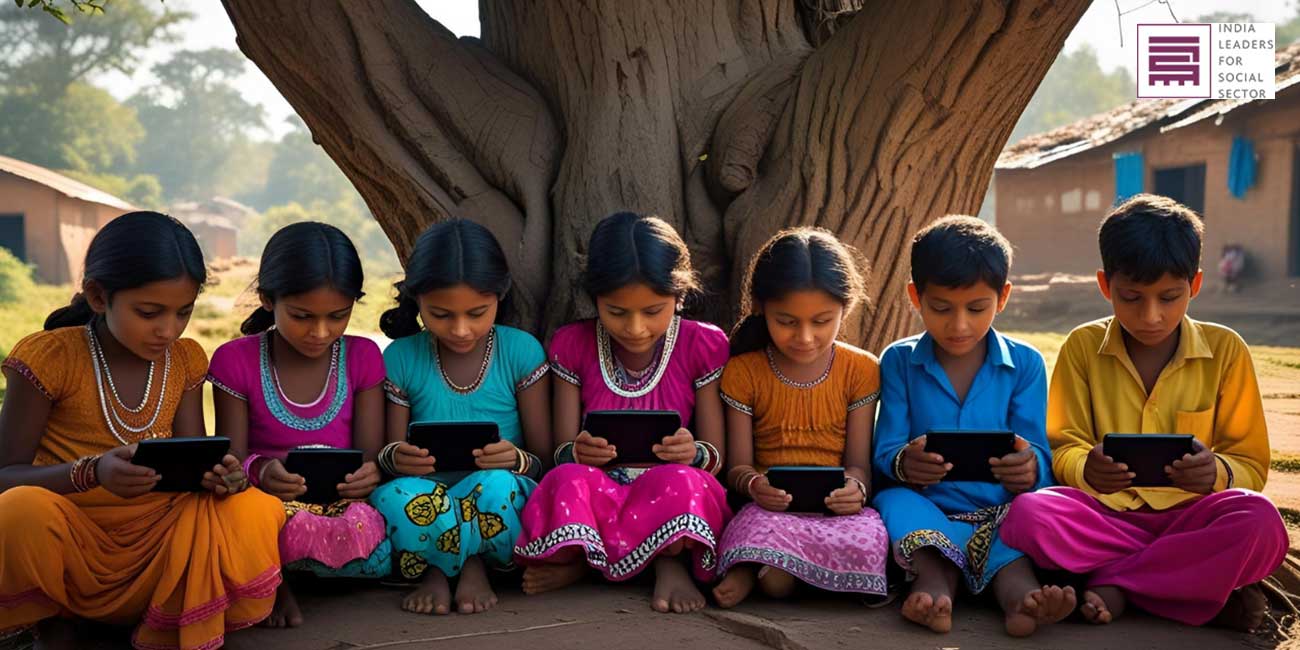India, a land of vibrant diversity and immense potential, is rapidly harnessing the power of digital innovation to address its biggest social challenges. Beyond the booming tech industry, a silent revolution is happening within the social sector, where technology is becoming a powerful equaliser, extending reach and amplifying impact.
The Digital India Vision: A Foundation for Social Change
The year 2015 marked the launch of the ‘Digital India’ initiative with the ambition to transform India into a digitally empowered society and knowledge economy. The core focus areas were developing robust digital infrastructure, delivering government services digitally, and enhancing digital literacy1. This vision laid the foundation for a plethora of digital innovations to flourish, reaching even the remotest corners of the country.
Key pillars that have directly impacted the social sector include:
- Aadhaar: This unique identification system has become a foundational element for administering various social welfare schemes, ensuring transparency and reducing leakages by enabling direct benefit transfers (DBT) to beneficiaries’ bank accounts. As of April 2025, over 1.4 billion Aadhaar IDs have been generated, significantly increasing financial inclusion2.
- Unified Payments Interface (UPI): UPI has revolutionised digital payments, making financial transactions seamless and accessible even for those in rural areas. It has redefined how money moves, contributing to an 83% share of all digital payments in India as of early 20252. This financial inclusion is crucial for empowering vulnerable communities.
- MyGov.in & UMANG: These platforms foster citizen engagement in governance and provide a consolidated mobile platform for accessing over 1,000 government services, from bill payments to healthcare, simplifying interactions and making services more citizen-centric1.
- Common Service Centers (CSCs): These digital access points, especially in rural and remote areas, provide essential services like healthcare, financial services, and education, bridging the digital divide at the grassroots level1.
Impact Stories: Digital Catalysts for Social Good
The theoretical framework of Digital India translates into tangible impact through various initiatives and the tireless efforts of social purpose organisations (SPOs).
Education Online learning platforms like DIKSHA, SWAYAM, and e-Vidya have democratised learning, making quality education accessible regardless of geographical location. NGOs like Educate Girls have leveraged mobile-based tools for continuous data collection and monitoring of attendance and learning outcomes, helping retain over 240,000 girl children in school in Rajasthan.
Public Health In public health, digital tools are enhancing program delivery at scale. FMCH effectively reached over 147,000 families in 2023–24 by integrating health guidelines and real-time dashboards. This digital approach empowered field teams for proactive care delivery and demonstrated high adoption rates among first-time users, including Anganwadi workers.
Food Security The Akshaya Patra Foundation utilises big data analytics to optimise the mid-day meal distribution, minimising transportation costs through efficient route allocation and reaching millions of children across India.
Rural Development & Livelihoods Organisations like Swades Foundation in Maharashtra use mobile-based data collection to track individual and household livelihood, health, and education status, enabling effective resource mobilisation for sustainable impact. The Paani Foundation leverages community engagement and technology for water conservation and sustainable agriculture, empowering thousands of villages.
Challenges and Opportunities
Despite the remarkable progress, the journey of digital transformation in India’s social sector is not without its hurdles:
- Infrastructure and Connectivity: Challenges remain in ensuring consistent high-speed internet access across all villages, with issues of non-functional broadband points and slow internet speeds in certain areas.
- Digital Literacy: A high level of digital illiteracy, especially in rural areas, remains a significant barrier to the effective adoption and utilisation of digital tools. Initiatives like the National Digital Literacy Mission are addressing this by certifying millions of rural citizens.
- Data Privacy and Security: The increasing reliance on digital platforms necessitates robust measures for data privacy and security, as concerns around data management and misuse intensify.
- Funding and Scalability: Many social initiatives struggle with funding constraints and the challenge of scaling successful pilot projects for broader impact. Donors are increasingly being urged to view digital capabilities as core infrastructure costs rather than just overhead.
However, these challenges present significant opportunities. The momentum is shifting, with more social purpose organisations actively seeking digital solutions and funders becoming more open to supporting technological infrastructure. The ‘India Stack’ model, with its interoperable, inclusive, and scalable digital public infrastructure, is being studied and adopted globally, showcasing India’s potential to lead in responsible technology development2.
The Future is Digital and Inclusive
The future of digital innovation in India’s social sector is promising. Emerging technologies like Artificial Intelligence (AI) and Machine Learning (ML) are being deployed to analyse vast datasets, predict trends, and tailor interventions in areas like poverty, disease outbreaks, and environmental degradation3.
The emphasis is on building an inclusive digital future, where technology empowers individuals, enhances service delivery, fosters collaboration, and provides data-driven insights for evidence-based policymaking4. India’s journey demonstrates that digital transformation is not merely about adopting new technologies but about reimagining how we learn, interact, work, and deliver value to communities, ultimately striving for a more equitable and sustainable world.
About the Author
With over 5 years of Experience, Mehak is deeply passionate about reshaping the landscape of higher education in India. She has previously worked as a consultant at 9.9 Education setting up higher education institutions from scratch of idea to implementation. She is a Young India fellow from Ashoka University, and also an alumni of University of Hyderabad and University of Delhi.
Reference articles:
- India-briefing.com. “India’s Digital Transformation.
- Vision IAS. “Digital India: Transforming a Nation Through Technology Revolution.
- NGOFeed.com. “Digital Dividends: How NGOs Are Leveraging Technology to Maximize Social Impact.
- Digitalsocialinnovation.org. “The Challenges and Opportunities of Digital Social Innovation.









